The concept of using menstrual blood as a form of ‘medicine’ might seem unsettling. However, experts suggest that period fluids could potentially combat various neurodegenerative diseases, including Alzheimer’s.
Dr Karan Rajan, an NHS surgeon and lecturer at the University of Sunderland, is one such expert who has highlighted the ‘amazing’ potential of menstrual blood in a video shared on Instagram. The appeal particularly lies in its stem cells – often dubbed ‘master cells’ – which can transform into various other cells within the body.
“Can menstrual blood cure Alzheimer’s?”, he asked his 1.6 million followers (@drkaranrajan). “Let me give you the bad news and the good news. So, the endometrium, the lining of the womb, is the only part of the adult human body that can heal itself without scarring every month.
“And that’s down to the amazing regenerative abilities of menstrual blood-derived stem cells. Basically, the biological version of Play-Doh, these stem cells can turn into a number of different cell types – bone, brain, liver, blood, heart and more.
“The issue is, this research is in a very, very early stage – even in mice. Most of the data we have is from cells in a petri dish or from animal models and there is a long way to go before we translate it into human studies.”
A study led by China’s Zhejiang University in 2018 is among the research shedding light on this topic. The project found that menstrual blood-derived ‘mesenchymal’ stem cells had anti-inflammatory effects and significantly improved spatial learning and memory in mice.
While these cells are found all over the body, menstrual blood-derived cells were especially praised for their high proliferation rate. They are also much easier to obtain without ethical concerns, with experts labelling them a ‘promising therapeutic candidate’ for Alzheimer’s.
The research comes at a time when Alzheimer’s affects around 982,000 people in the UK, according to the Alzheimer’s Society. Currently, Alzheimer’s is recognised as the most common type of dementia – a term used to describe symptoms that occur when brain function declines.
As the NHS explains: “Dementia is not a single disease. There are different diseases that can cause dementia. Many of these diseases are associated with an abnormal build-up of proteins in the brain.
“This build-up causes nerve cells to function less well and ultimately die. As the nerve cells die, different areas of the brain shrink.”
“This build-up causes nerve cells to function less well and ultimately die. As the nerve cells die, different areas of the brain shrink.” While it’s still early days for menstrual stem cell research, Dr Rajan believes that this ‘knowledge may be revolutionary’ one day.
Closing his video, he said: “Not just to achieve medical breakthroughs, but to destigmatise periods once and for all. It’s a strange poetic justice that society that historically looked down upon menstruating women and labelled period blood as ‘unhygienic’ will be reliant on the very same thing it’s sought to outcast.”
